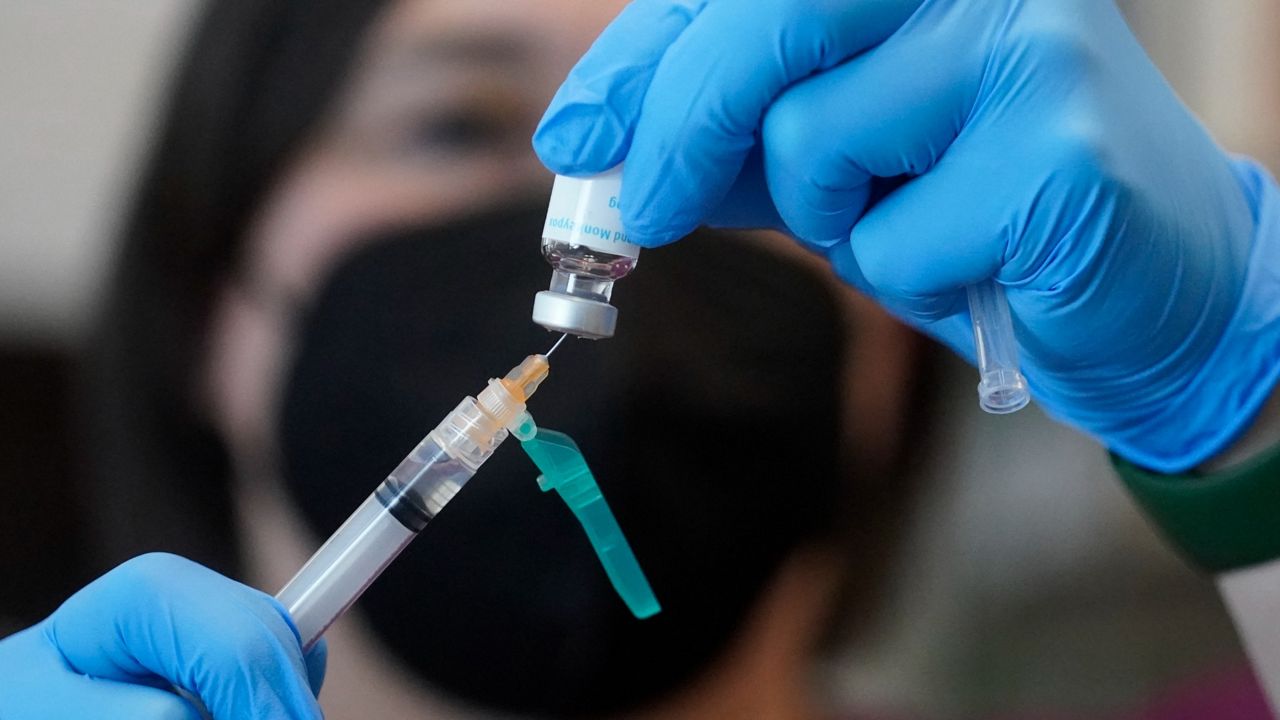The Centers for Disease Control and Prevention launched a new pilot program Tuesday aimed at improving monkeypox vaccine equity.
What You Need To Know
- The Centers for Disease Control and Prevention launched a new pilot program Tuesday aimed at improving monkeypox vaccine equity
- Data show the vaccination rates of Black and Hispanic men are not keeping pace with the infection rates of those groups, said CDC Director Dr. Rochelle Walensky
- The new pilot program will focus on smaller events and projects that can help reach groups facing barriers to vaccination
- Meanwhile, the CDC is hoping health departments and HIV organizations will play roles in controlling the monkeypox outbreak
In making the announcement Thursday, CDC Director Dr. Rochelle Walensky said data show the vaccination rates of Black and Hispanic men are not keeping pace with the infection rates of those groups.
Black men account for 38% of U.S. cases, but just 12% of vaccinations, Walensky said. Hispanic men represent 28% of infections, but 21% of vaccinations. By comparison, white men account for 26% of cases and 47% of vaccinations.
The virus, which is transmitted through close or intimate contact, has primarily spread among gay and bisexual men. There have been nearly 23,000 infections in the U.S. during the outbreak and one death, according to CDC data.
Last month, the Biden administration launched a pilot program for vaccinating, testing and educating people about monkeypox at large LGBTQ events. The program has helped inoculate more than 10,000 people at events in places such as New Orleans; Atlanta; Charlotte, North Carolina; Boise, Idaho; and Oakland, California.
The new pilot program will focus on smaller events and projects that can help reach groups facing barriers to vaccination such as language differences, distance to vaccination sites, vaccination hesitancy, government mistrust, lack of access to online scheduling technology, disability issues, immigration status and stigma.
Improving vaccine access in communities of colors is an especially high priority, said Dr. Demetre Daskalakis, White House monkeypox response deputy coordinator.
“We are now entering the harder phase of the vaccination campaign where we need to work to make sure that we continue to get first doses into arms and ease access for second doses,” Daskalakis told reporters. “That means we need to use hyperlocal strategies that let us reach deeper into the community.”
Local health departments and organizations can apply to receive materials and technical assistance to execute hyperlocal vaccination strategies. The Biden administration has allocated 10,000 vials of the Jynneos vaccine, or 50,000 doses, to the program.
Meanwhile, the CDC is hoping health departments and HIV organizations will play roles in controlling the monkeypox outbreak. The CDC issued guidance last week telling those agencies and groups that their staffs and budgets could be used to help fight monkeypox.
Daskalakis said a recent CDC study found that 61% of people diagnosed with monkeypox either had HIV or a sexually transmitted infection.
“The same people we need to test for HIV and sexually transmitted infections and lead to prevention and care are the same people who need monkeypox-related services like testing, education and vaccines,” he said.
“This important change in guidance to recipients of these funds allows our frontline health departments and community-based organizations to use their HIV and STD resources to accelerate us all to the end of the monkeypox outbreak and will also help us do better HIV and STD prevention for the exact same population.”
Walensky said most local health departments have not received any additional resources dedicated to fighting monkeypox. The Biden administration is asking Congress for $4.5 billion in emergency funding to respond to the outbreak.
In an encouraging sign, the number of new monkeypox infections in the U.S. is falling. The latest seven-day average of 170 is down 63% from Aug. 10, when it was 461.
Walensky said she attributes the improvement to “the multilayered approach of all the things that we're doing, the testing that we scaled up, the massive amounts of education and outreach, the vaccinations that we've been able to get out and still … are working to get to harder-to-reach communities.”
But with cases increasing in some parts of the country, Daskalakis acknowledged there’s “more work to be done." Walensky said the CDC is keeping the “pedal to the metal.”
The CDC recommends the monkeypox vaccine for anyone who has had recent close contact with an infected person, as well as for gay or bisexual men who have had sex with multiple or unfamiliar partners in the past two weeks.



